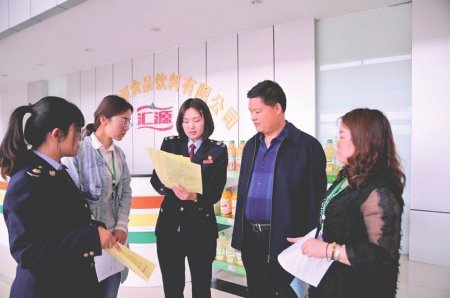Tax reductions help Shanxi firms to overcome COVID-19 impact
Updated: 2021-02-04

Officials of Shanxi Provincial Tax Service introduce preferential taxation policies to a business operator in Shanxi province. [Photo/shanxi.gov.cn]
North China's Shanxi province stimulated the vitality of local market entities by implementing preferential taxation policies and services in 2020.
The data shows that from January to November (the taxation period of 2020), the province reduced taxes for local enterprises by a total of 12.6 billion yuan ($1.95 billion), relieving their burdens and helping them survive during the COVID-19 pandemic period.
In the past year, Shanxi has established tax service accounts for 248 key provincial projects, carrying out targeted policy promotion and guidance according to projects' scale, industrial orientation and leading features.
Liu Wei, an official with the Shanxi Provincial Tax Service, said that the tax service department has set up service groups for enterprises, which resolved or answered a total of 326 tax-related claims last year.
The Jinzhong hydrogen energy project of Shanxi Meijin Energy Co was one of the beneficiaries.
"Since the project landed in Jinzhong, tax officials have answered our company's tax-related issues. They immediately reduced the tax amount by 1.12 million yuan for the initial stage of the project's construction," said Li Fei, the person in charge of the project.
Due to the Shanxi Provincial Tax Service's targeted services, the production and operation of key enterprises in Shanxi have continued to improve. Also, the economic development momentum of emerging industries has remained strong.
The added value of new-energy power generation sectors – including wind, solar and biomass energy – increased 20.63 percent year-on-year. In comparison, the added value of advanced manufacturing industries such as pharmaceutical and computer manufacturing increased 32.04 percent year-on-year.
In addition to enterprises in crucial industries, Shanxi's preferential tax policies and measures have helped small and micro-sized enterprises that the pandemic has negatively impacted.
From January to November, Shanxi's tax authority reduced 3.26 billion yuan in tax for small and micro-sized enterprises. Officials also cooperated with financial institutions to grant loans of 27.09 billion yuan to 9,854 small and micro-sized enterprises by the end of November.
"The money saved because of the preferential tax policies allows us to maintain our business," said Wang Maolin, the owner of a small restaurant in Ningwu county. Wang's business enjoyed a value-added tax reduction of some 60,000 yuan last year.
Shanxi's preferential tax services are based on local conditions and corporate situations and have stimulated enterprises' enthusiasm for innovation and injected strong vitality into the development of high-tech enterprises.
Yue Qingsong, an official with the Shanxi Provincial Tax Service, said that the implementation of the tax reduction policy helped reduce business operating costs, increased cash flow and innovation revenue, and accelerated the development of innovative enterprises.
According to statistics, 179 national and international advanced products emerged in Shanxi in 2020. These products covered five fields, including digital economy, new equipment and new materials sectors.
The output of photovoltaic cells and mobile phones increased 35.8 percent and 21.4 percent year-on-year, respectively, and the added value of the new-generation information technology industry grew 12.8 percent.



